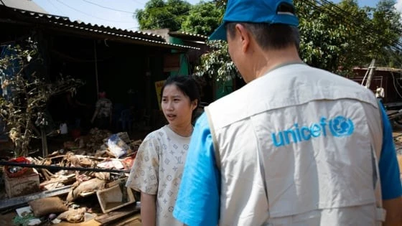The United Nations Children's Fund (UNICEF) said on August 14 that globally, nearly 500 million children, mainly in West and Central Africa, have had to live in heat above 35 degrees Celsius for more than half a year.

One in five children globally, or 466 million, live in areas that experience at least twice as many extremely hot days each year as they did six decades ago, according to a UNICEF report.
UNICEF’s analysis of national data also shows that in 16 countries, children now experience more than a month of extremely hot days compared to 60 years ago. For example, in South Sudan, children have experienced an average of 165 extremely hot days annually this decade, compared to 110 in the 1960s, while Paraguay has seen an increase from 36 to 71 days.
Globally, children in West and Central Africa are facing the highest levels of exposure to hot days, with the most significant increases over time.
That means 123 million children, or 39% of children in West and Central Africa, now spend an average of more than a third of the year, or at least 95 days, in temperatures above 35 degrees Celsius, with up to 212 days in Mali, 202 days in Niger, 198 days in Senegal and 195 days in Sudan, UNICEF said.
Meanwhile, in Latin America and the Caribbean, nearly 48 million children live in areas that experience twice as many extremely hot days each year as six decades ago.
UNICEF Executive Director Catherine Russell said children are more vulnerable than adults to extreme heat, which is particularly dangerous for newborns, as the heat causes their heart rates to increase. High temperatures are therefore even more alarming for children than for adults.
Additionally, heat stress in the body from exposure to extreme heat also poses particular threats to the health of pregnant women, being associated with pregnancy complications and adverse birth outcomes, including stillbirth, low birth weight, and preterm birth.
In addition, excessive heat also contributes to malnutrition in children, heat-related non-communicable diseases and makes children susceptible to infectious diseases spread in high temperature environments such as malaria and dengue fever, in addition to affecting the development of the nervous system and mental health.
“The hottest summer days are now becoming the norm. Extreme heat is on the rise, affecting children’s health, well-being and daily activities,” said Russell.
The UNICEF Executive Director therefore called on governments to take action to control rising temperatures, with climate policies and action plans taking into account children today and future generations.
UNICEF also calls on leaders, governments and the private sector to take urgent climate action to protect children's rights and interests, so that every child enjoys a clean, healthy and sustainable living environment.
Source






![[Photo] Cutting hills to make way for people to travel on route 14E that suffered landslides](https://vphoto.vietnam.vn/thumb/1200x675/vietnam/resource/IMAGE/2025/11/08/1762599969318_ndo_br_thiet-ke-chua-co-ten-2025-11-08t154639923-png.webp)



































![[Video] Hue Monuments reopen to welcome visitors](https://vphoto.vietnam.vn/thumb/402x226/vietnam/resource/IMAGE/2025/11/05/1762301089171_dung01-05-43-09still013-jpg.webp)






















































![Dong Nai OCOP transition: [Part 2] Opening new distribution channel](https://vphoto.vietnam.vn/thumb/402x226/vietnam/resource/IMAGE/2025/11/09/1762655780766_4613-anh-1_20240803100041-nongnghiep-154608.jpeg)












Comment (0)